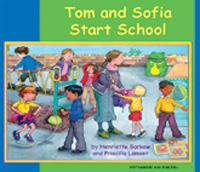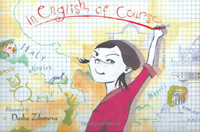
|
|
|
In
This Issue:
• Feature Article: Race, Politics and the Middle School Cafeteria
• Language Lizard Update: Summer reflections and gearing up for the school year
• Product Review: Tom and Sofia Start School
• *Subscriber Special Offer*: Discount on books/CD for new students
• Lizard Recommends: “In English, of Course”
Please add [email protected] to
your address book or whitelist in your email program so that
you receive all future issues!
To change your subscription, see link at end of email.
If this issue has been forwarded to you, please sign up here
to receive our e-newsletter.
|
|

|
Language Lizard
Update
Dear Reader:
I hope you are enjoying your summer and finding spare moments to read and practice languages with your children.
With all the press about the immigration bill and the presidential race this summer, I have spent some of my free moments reflecting on our increasingly diverse communities and what Language Lizard can do to support multicultural families and to encourage greater cultural understanding among young children. As such, Language Lizard is continuing to work with education experts on more lesson plans and activities to support ethnic communities. We will continue to share this work and make it available to our customers and readers. For those of you who have not yet seen our multicultural lesson plans, you can find them at: http://www.languagelizard.com/lessonplans.htm.
I also want to share in this issue a thought-provoking article by Ruth Kunstadter, an educator and product developer who has spent her career celebrating this country’s multicultural heritage. Her article, framed in the context of the presidential race, offers insight into the experience of bicultural families and students.
And as summer progresses, we begin to think of the new school year. For those of you with family, friends or students just starting school, you may wish to take advantage of this month’s discount on our bilingual books Tom and Sofia Start School (reviewed in this issue) and Sam’s First Day.
Happy reading!
Anneke Forzani
Founder and President
Language Lizard, LLC
|
|
 |
 Book Review: Tom and Sofia Start School Book Review: Tom and Sofia Start School
By Henriette Barkow
Illustrated by Priscilla Lamont
Ages 4-8
Review by Natalie Kunstadter
The first day of school can be nerve-racking, but Henriette Barkow’s book about Tom and Sofia proves to children that there is no reason to worry. After shopping for school supplies, the two new students head off to make new friends, play new games, and experience a completely new environment. The book, which is available in 26 different languages, is perfect for a child who is getting ready for his or her own first day of school.
Tom and Sofia Start School is available in English with translations in: Albanian, Arabic, Bengali, Chinese-Traditional, Chinese-Simplified, Farsi, French, German, Greek, Gujarati, Hindi, Italian, Japanese, Kurdish, Malayalam, Panjabi, Polish, Portuguese, Russian, Somali, Spanish, Tagalog, Turkish, Urdu, Vietnamese.
If you’re interested in purchasing this book, please visit the Tom and Sofia Start School webpage at: http://www.languagelizard.com/Tom_and_Sofia_Start_School_p/sch.htm.
|
|

|
Special Subscriber Offer: 10% Discount on our “Starting School” titles.
Through September 30, 2007 we are offering a 10% discount on the following books:
Simply apply Coupon Code CCS-SCH upon checkout to receive the discount:
To see the difficulty level of these and other Language Lizard books, please visit our “Book Suggestions” page at: http://www.languagelizard.com/images/Childrens_Bilingual_Books.pdf |
|
 |
Race, Politics and the Middle School Cafeteria
by Ruth Kunstadter
For the first time, two serious presidential contenders are not white. One is African-American, and one is Latino.
But wait ... they're not entirely African-American or Latino, either.
They are biracial and bicultural.
And as a result, they are facing the same kind of slurs and scrutiny that have normally been reserved for middle school cafeterias.
And many of those slurs are coming not only from the "white table," but from within the ethnic communities themselves.
And why? For some, it's because they're African-American or Latino.
For others, it's because they're not African-American or Latino "enough."
This should come as no surprise to anyone who has worked in public education. But it certainly is interesting to see it played out on a national stage.
In our increasingly multicultural and multiracial nation, many children of bicultural marriages are never quite sure which box to check on official forms, or which table to choose in the cafeteria.
Depending on their last name, or how "ethnic" they look, some have the option of operating as "white." Others are immediately classified according to their skin color or last name.
But most, if not all, will ultimately straddle the two cultures. And they will spend an inordinate amount of time trying to convince people that yes, they are Latino and/or African-American (or any other ethnicity) -- and at the same time, yes, they are "American."
Criticism from both sides
New Mexico Gov. Bill Richardson has received criticism from both sides of the spectrum -- for being too Latino, or not Latino enough. Some claim he tried to hide his Latino roots behind his "gringo" last name. Others feel he flaunts his Latino heritage too much, or only at politically convenient times. Some fault him for trying too hard to capitalize on being the "Latino candidate," while others criticize him for running as an "American candidate, not a Hispanic candidate."
He speaks Spanish fluently and was chairman of the Congressional Hispanic Caucus -- and yet a recent poll showed that many Latino voters still do not realize there is a Latino candidate for president.
Richardson's experience is echoed every day in middle school hallways and cafeterias across the nation. People want him to choose between one side or the other. What are you -- Latino or American? And what about you, Barack Obama -- are you black or white?
Obama, son of a black Kenyan father and white Midwestern mother, has been challenged on the same issues. Is he capitalizing on his blackness? Is he trying to "act white"? Is he too black, or not black enough? Too white, or not white enough?
In presidential politics, as in middle school cafeterias, there is overwhelming pressure to choose one side over the other. But the truth is, Bill Richardson and Barack Obama, like all bicultural or multicultural individuals, do not need to hide or deny -- or, alternatively, over-inflate -- one heritage at the expense of the other.
The two sides of their cultural heritage are not mutually exclusive.
Bill Richardson is Latino, and he is American. Barack Obama is both "black" and "white."
More and more Americans today find themselves living in that middle ground, drawing on two distinct heritages and creating a unique self out of the two. They don't know which table to join because they really represent three cultures: their mother's, their father's and their own.
And despite the fact that people on either side will always be pressing them to choose, the choice has already been made. They are from both cultures, and at the same time, they belong to something new.
Forcing us to choose
Realistically, most of us qualify as "multicultural" (Those genealogical DNA tests can hold quite a few surprises!). And we should stop trying to make our candidates -- or anyone else -- "choose."
Our goal, as a society, should not be to make people decide between one side of their heritage or the other or to accuse them of being too much of one side, or too deficient in the other. Our goal instead should be a celebration of both sides, and of the combination of the two.
We are not too Latino, or too African-American, or too anything. Neither are we "not Latino enough" or "not black enough."
We are America, and we have been a multicultural nation from our very inception. That is our strength and, increasingly, our future.
It's time for a new table in the cafeteria -- one that reflects our new reality.
And for once, our candidates reflect this reality, too.
Ruth Kunstadter of Montclair is an educator and founder of Chispa Productions (www.ChispaProductions.com), which creates multimedia materials that teach languages while celebrating multicultural heritage in the United States. She is author of the forthcoming book "The Bilingual Soul."
This article was first published in the Record on July 3, 2007. Reprinted with permission of author.
To see more articles and archived newsletters, please visit: http://www.languagelizard.com/newsresources.htm.
|
|
 |
A Favorite Quote
If you talk to a man in a language he understands, that goes to his head. If you talk to him in his own language, that goes to his heart.”
- Nelson Mandela |
|
 |
About Language Lizard
Language Lizard, LLC aims to enrich children’s lives with language and culture. The Company believes that children will be inspired to learn languages and to connect with other cultures if they are exposed to fun and creative learning materials early in their lives.
Language Lizard currently offers award-winning dual-language children’s products in over 40 languages and complimentary multicultural lesson plans and activities. To find out more about our company and products, or to sign up for this complimentary e-newsletter, please visit http://www.LanguageLizard.com.
|
|
 |
 In English, of Course In English, of Course
In English, of Course is a unique book that takes a comedic slant on children’s acquisition of a second language. In it, newcomer Josephine must use her “broken English” to tell her multicultural class about her life in Naples, Italy. Instead, with vocabulary prompts from her teacher, she ends up describing a hilarious trip to a farm. Proud of her accomplishment, she looks forward to relating more stories to her class. It is also available in a Spanish edition, En Ingles, por Supuesto.
|
|
| |
|
